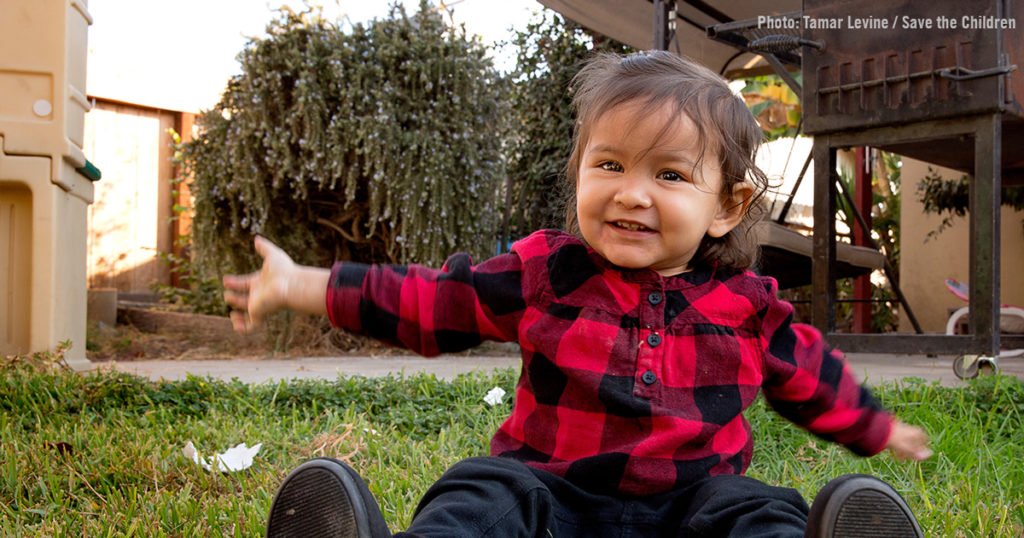
Photo: Tamar Levine/Save the Children
After 9/11, Americans showed extraordinary appreciation for first responders and others who put their lives at risk for the common good. Unfortunately, that fanfare didn’t last long, nor was it backed up by the financial support that public officials initially promised.
During the current pandemic, we run the risk of treating our child care professionals the same way.
Across America, child care professionals are deemed “essential.” By caring for the children of first responders, health personnel, and others in the fight against COVID-19, child care workers put themselves at risk of exposure - even as most remain underpaid and underinsured.
New Mexico has sought to protect child care providers and staff by delivering personal protective equipment (PPE) like surgical masks, face coverings, and gloves, as well as providing no-touch thermometers. The state has also waived copays for families on child care assistance, offered differential pay to providers who stay open to serve essential workers, and distributed incentive pay directly to staff for their service during the public health emergency.
Unfortunately, it’s not enough. New Mexico has seen nearly half of its child care providers temporarily shut down - and some won’t be able to reopen when it’s safe to do so.
Why does any of this matter? Because the way we treat our children in their earliest years can shape their cognitive, socio-emotional, and physical development for the rest of their lives. We see it in our work every day: by delivering thoughtful, well-designed programs and supports, we can help kids develop healthy hearts, minds, and bodies - and improve the wellbeing of entire communities.
That’s why advocates have spent decades working to put early childhood on an equal plane with K-12 and higher education. In four states, we have established cabinet-level departments to coordinate early childhood services. And earlier this year, New Mexico created a first-in-the-nation Early Childhood Trust Fund to support high-quality educational programming.
Today, however, the early childhood professionals who deliver these services are watching their industry crumble. In order to contain the spread of COVID-19, parents aren’t sending their kids to child care. Centers, seeing their enrollment numbers drop, are laying off workers. And some staff - fearing for their families’ safety - are staying home. Across American, tens of thousands of child care centers have closed their doors.
Recently, Congress passed the CARES Act stimulus package, which included $3.5 billion to prop up child care providers during the health emergency. This was a good first step, and we are grateful, but it wasn’t nearly enough.
States need tens of billions more in federal funding for child care stabilization and recovery, and Americans are eager to deliver it. Eighty-seven percent of Americans - including 82% of Republicans and 94% of Democrats - support direct federal assistance so that child care providers can meet payroll and pay rent and utilities.
To meet these needs, New Mexico has begun funding child care recovery grants, replacing lost income from temporary COVID-related closures and supporting recovery costs, including enhanced cleaning and sanitation expenses. Without more federal support, though, some providers won’t survive.
Of course, survival alone isn’t the goal.
Instead, it’s time that we fully recognize the indispensable value of high-quality childhood services, and then create the supports that will help educators, parents, communities - and most importantly, our children - to thrive over the long-term. That means constructing better-supported pathways into the field; increasing educational opportunities, compensation, and insurance coverage for our professionals; and ensuring that early childhood practices reflect our best understanding of healthy child development.
No one doubts that our schools, colleges, and universities will be here when this public health emergency is over. Unfortunately, we don’t have the same confidence about our early childhood institutions.
This is deeply ironic. Right now, tens of millions of parents are at home with their children - and more conscious than ever of the knowledge, skill, patience, and understanding it takes to deliver high-quality early childhood education and care.
Let’s learn from this moment - and then let’s strengthen our early childhood system so that children and families across America have what they need to learn and grow.